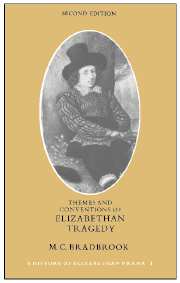Book contents
4 - ELIZABETHAN HABITS OF READING, WRITING AND LISTENING
Published online by Cambridge University Press: 08 January 2010
Summary
The title of this chapter may suggest something very remote from tragic conventions, but the main purpose of the last chapter has been to show that the Elizabethans did not rely upon narrative and characterisation to the same extent as the modern author. They were much more interested in direct moral instruction on the one hand, and in the play of words or images on the other. These interests, like the ‘feeling for allegory’ (which is their offspring), were cultivated by education and canalised by habits. It will be necessary, therefore, to consider these habits before going on to the conventions of dramatic speech, which are to be considered in the next chapter.
The different orientation of Elizabethan writing is, of course, generally recognised. It is a commonplace that the aim of writers was primarily moral and their methods primarily rhetorical. The close connection of these two habits and their effect upon the importance of narrative and character has not, however, been so widely acknowledged.
Without some preliminary investigation of the kind attempted in this chapter, it might seem very unlikely that the audience could give that kind of attention to a play which the subsequent chapters imply. There can be no certainty as to how far they were conscious of what they were doing, or of what the author had been doing when he wrote; but it seems clear that they read and listened to poetry with a different kind of attention from that of to-day.
- Type
- Chapter
- Information
- Themes and Conventions of Elizabethan Tragedy , pp. 69 - 89Publisher: Cambridge University PressPrint publication year: 1980



